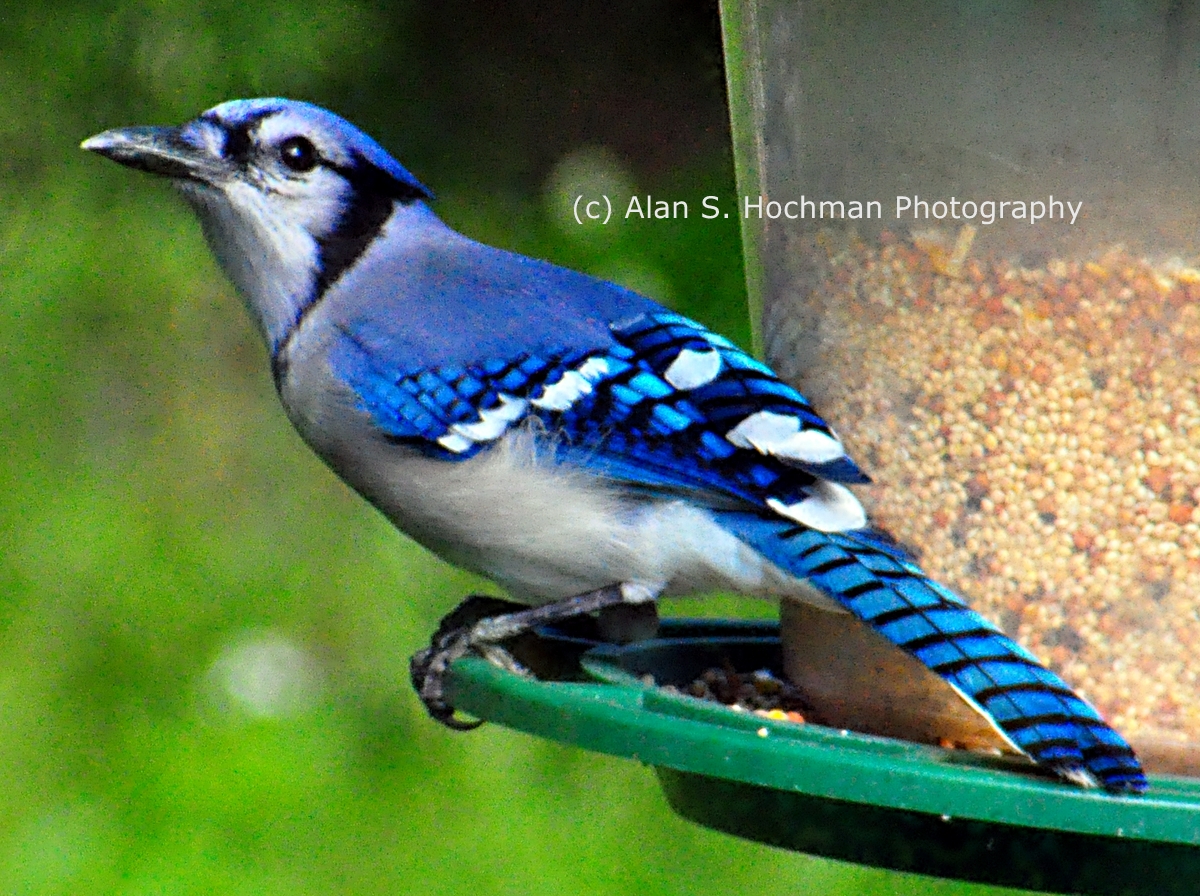WILDLIFE PHOTOGRAPHY – MY BACKYARD, FL
This photograph of a Blue Jay was taken at a bird feeder using a Nikon D90 with a Tamron 28-300mm lens attached. For those interested in photographing wild birds in your own backyard, simply put up a few birdfeeders filled with wild bird seed, and watch them come! You will be surprised at the amount and variety of species that will come to visit.
The Blue Jay (Cyanocitta cristata) are passerine birds in the family Corvidae, native to North America. It is resident through most of eastern and central United States and southern Canada, although western populations may be migratory. It breeds in both deciduous and coniferous forests, and is common near and in residential areas. It is predominately blue with a white breast and underparts, and a blue crest. It has a black, U-shaped collar around its neck and a black border behind the crest. Sexes are similar in size and plumage, and plumage does not vary throughout the year. Four subspecies of the Blue Jay are recognized.
The Blue Jay mainly feeds on nuts and seeds such as acorns, soft fruits, arthropods, and occasionally small vertebrates. It typically gleans food from trees, shrubs, and the ground, though it sometimes hawks insects from the air. It builds an open cup nest in the branches of a tree, which both sexes participate in constructing. The clutch can contain two to seven eggs, which are blueish or light brown with brown spots. Young are altricial, and are brooded by the female for 8–12 days after hatching. They may remain with their parents for one to two months before leaving the nest.
The Blue Jay measures 22–30 cm (9–12 in) from bill to tail and weighs 70–100 g (2.5–3.5 oz), with a wingspan of 34–43 cm (13–17 in). There is a pronounced crest on the head, a crown of feathers, which may be raised or lowered according to the bird’s mood. When excited or aggressive, the crest may be fully raised. When frightened, the crest bristles outwards, brush like. When the bird is feeding among other jays or resting, the crest is flattened to the head.
Its plumage is lavender-blue to mid-blue in the crest, back, wings, and tail, and its face is white. The underside is off-white and the neck is collared with black which extends to the sides of the head. The wing primaries and tail are strongly barred with black, sky-blue and white. The bill, legs, and eyes are all black. Males and females are nearly identical.
As with other blue-hued birds, the Blue Jay’s coloration is not derived from pigments but is the result of light interference due to the internal structure of the feathers; if a blue feather is crushed, the blue disappears as the structure is destroyed. This is referred to as structural coloration.
Blue Jays have strong black bills used for cracking nuts and acorns, and for eating corn, grains and seeds, although they also eat insects such as beetles, grasshoppers, and caterpillars.

Really good photography
VERY COOL PHOTO
Are you only into birds and bugs?
COOL JAY PIC
You know what your doing. Here is the proof!
Blue Jay at Bird Feeder http://t.co/tRDSkcaD
i love the Blue Jay http://t.co/LzgKbDNR via @wibiya
I luv these birds but they are noisy!
Excellent pic. Vibrant color
Such strong blue color!! I have them in my backyard too.
I love these bluejays. They are so pretty..and noisy!
Great photo Alan. I also use bird feeders.
Great bluejay closeup
Very nice photo
Good shot Alan Your photos are incredible.
What part of South Florida do you live?
Beautiful Blue Jay http://t.co/N6Es5tgE
Beautiful RT”@Photobug52: Blue Jay at Bird Feeder http://t.co/1uWjxnWb #bird #birding #birds #bluejay Visit http://t.co/wPidFZ4w“
Hi Alan, beautiful photo of the blue jay, love its blue feathers. The closest I’ve been to birds is when I had 2 love birds in a big rabbit cage in California and they sure bite. Poor things they weren’t happy in a cage but I didn’t want to release them outside in case they did not survive. So I gave them to a guy in Redlands, California who had a love bird farm with hundreds of birds he bred, so they were happy there with their little birdy friends. Happy photo days. Nanette